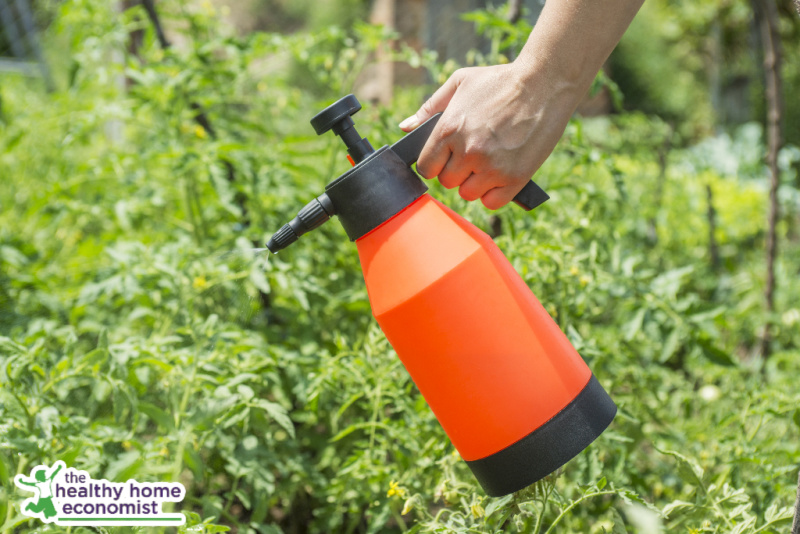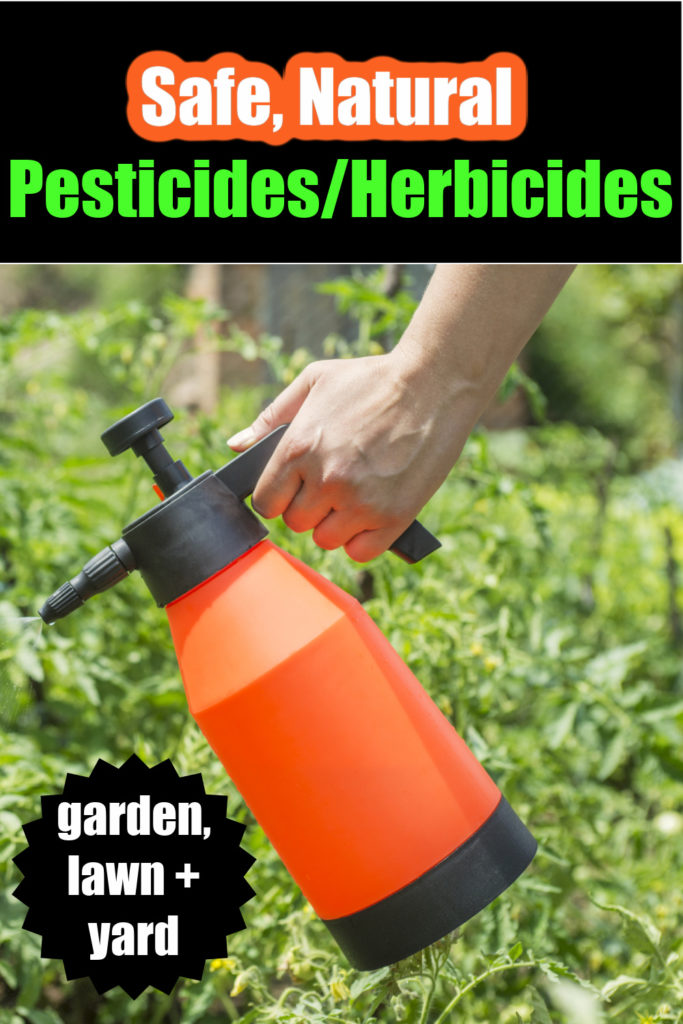Table of Contents[Hide][Show]
Four green herbicides and pesticides to use for the home garden and yard that are safe for children and pets.

Spring has sprung and so have the weeds and bugs! Instead of using chemical based herbicides and pesticides to keep things in order, why not try natural and green versions this year?
After all, these chemicals are linked to diabetes, dementia in adults and ADHD in children.
And that’s what science has only uncovered so far. There are likely other health risks over the long term as well from regular exposure in the home environment.
It is worth the effort to make the change to safer alternatives!
Here are a few of the tricks I use around my yard to control the growth and save myself loads of time, with no chemicals.
We’ve lived in our home for almost 30 years and have never resorted to conventional chemicals for the yard or garden even in buggy, hot, humid Florida.
Herbal Herbicide
With so much rapid growth in your flower beds, it’s important to be able to spray once in a while to control the undesirable plants.
It’s also convenient to spray around the bases of trees in the yard to simplify seasonal mowing duties. Perhaps you weren’t aware that clove oil can be used as a strong, yet nontoxic herbicide in your yard.
It is stronger than the vinegar and salt based herbicides that you may have tried in the past.
It is very expensive to buy clove oil based herbicides at the organic nurseries, so be aware that you can make them yourself much less expensively.
How to Make a Safe Herbicide with Clove Oil
To make a herbal herbicide with clove oil, mix the following ingredients in a one-gallon sprayer and mix gently.
- 8 Tablespoons clove oil (this would equate to one 4 oz bottle like this one).
- 1 gallon water
- 12 drops of dishwashing liquid. This functions as a nontoxic adjuvant which helps clove oil more easily penetrate the leaves.
Spray this mixture on all undesirable plants early in the morning after the dew dries making sure it will not rain at all that day.
Take care not to spray desirable plants as this mixture will burn any plant’s foliage, not just weeds. Weeds should begin to wilt and die within 8 hours or less!
I like to spray around my yard on a Saturday morning and many of the weeds were wilted and dead by dinnertime. Plus, my yard smells fabulous from the lovely clove scent!
Be aware that clove oil will burn your skin if it comes into contact, so it is wise to use gloves and protective goggles if applying on a breezy day.
Corn Meal
Once you have eliminated the weeds with your clove oil herbicide, you can prevent them from coming back by sprinkling corn meal in your flower beds and other areas to control new weed growth.
I usually reapply every month or so, and it sure does save a lot of time and effort preventing the weeds from growing in the first place! You will find over time that using corn meal will result in less and less weed growth.
I recommend using organic cornmeal that is also nonGMO verified (due to widespread issues with organic/GMO cross-contamination) to ensure you aren’t inadvertently adding glyphosate to the soil on your property. This is especially important if you use it on the garden.
I don’t recommend using masa harina as it has been treated with lime and isn’t as effective in preventing weeds.
The effectiveness of this treatment definitely grows with regular use over a period of time.
Boiling Water
I use a boiling tea kettle of water to eliminate those pesky weeds that spring up between bricks, pavers, and concrete seams. It also works quite well to eliminate ant piles from your yard!
It may take 2 or even 3 treatments before the ant pile is completely dead, but I have found this to be the best nontoxic way to get rid of those little critters without using any poison.
Ladybugs
Ladybugs are a beautiful and natural way to control pests in your yard and garden.
They mostly feed on aphids. However, they also consume other undesirables such as moths, insect eggs, mites, scales, thrips, leaf hoppers, mealybugs, chinch bugs, asparagus beetle larvae, red spider mites, and whitefly.
You can actually buy and ship ladybugs to your door very inexpensively if you don’t already have any in your area to naturally attract.
This article contains more information on how to use ladybugs for your garden.
Children find it very exciting to see them released when they arrive! It’s a beautiful sight!
I hope you find these natural and green yard tips helpful in your neck of the woods.
It is comforting to know that your children are playing in a yard that is pesticide and herbicide free!









How long does the clove oil herbicide stay potent? (in other words, must you mix/use each time or can you make a batch for the season?)
Not sure … I use it all up very quickly batch I make.
Will ths kill poison ivy? Do you know of anything that really works for that besides the bad chemicals?
Is the clove oil safe to use in a vegetable garden? Also, how heavily do you spread the cornmeal?
Kirk
Sprinkle the cornmeal fairly evenly across the soil. Here is a commercial brand (don’t use it …it’s GMO), but the directions tell you how much to spread. Use organic, nonGMO cornmeal and do the same thing. https://amzn.to/3s6Ecne
Clove oil will burn your garden plants, so if you use it to weed the garden, be sure you have good aim with the sprayer.
Any tips on preventing or killing off poison ivy? We live in the wooded area and it’s spreading everywhere.
Do you buy clove oil in bulk? I have a large yard and several flower gardens and it would be quite pricey to use small bottles of clove oil.
You probably can …. any full strength clove oil brand would be fine. I would make a gallon and test it around your property first. Note that this herbicide does not work as well for large weeds that are well established. It is best on younger, tender weeds just emerging in flower beds and such.
We spray white vinegar on weeds that grow in the cracks on and around the driveway and pavers. You don’t have to worry about accidentally burning yourself. It kills most weeds within a day or two; some may take a bit longer. It’s pretty inexpensive. We use white vinegar every day for laundry and cleaning.